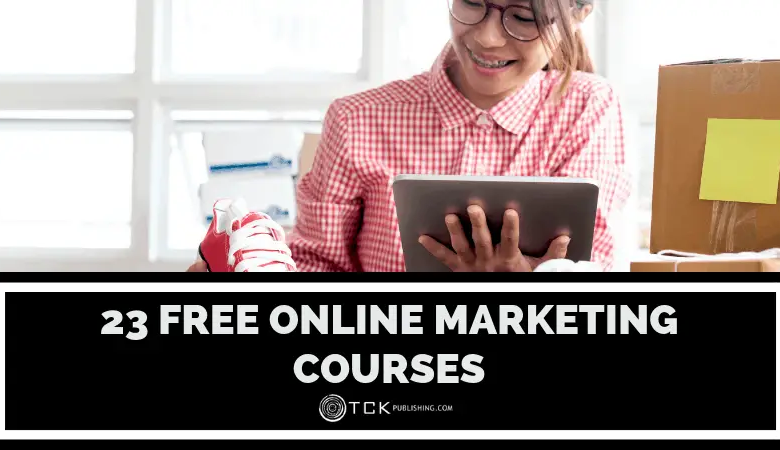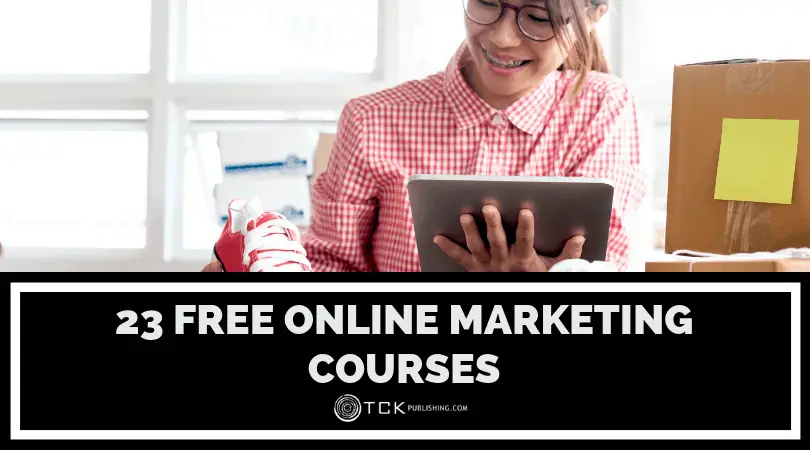
Online Marketing Courses Your Guide to Success
Online marketing courses are booming, and for good reason. Whether you’re a seasoned professional looking to upskill or a budding entrepreneur eager to launch your brand online, these courses offer a wealth of knowledge and practical strategies. This guide dives into the world of online marketing courses, exploring different types, platforms, and career opportunities that await.
From fundamentals to social media strategies and content marketing techniques, you’ll discover the essential components of effective online marketing. We’ll delve into the course content, available platforms, and the practical applications of your new skills. Learn how to navigate the digital landscape, build your personal brand, and leverage online marketing to achieve your professional goals.
Introduction to Online Marketing Courses
Online marketing courses are designed to equip individuals with the knowledge and skills needed to succeed in the dynamic world of digital marketing. These courses cover a broad range of topics, from search engine optimization () to social media management, providing a comprehensive understanding of online strategies. They empower learners to develop effective campaigns, attract target audiences, and drive conversions online.Online marketing courses are crucial for individuals seeking to build a career in digital marketing or enhance their existing skills.
They offer a structured learning environment, allowing participants to learn at their own pace and gain valuable insights from experienced instructors. The practical nature of these courses allows learners to apply their knowledge immediately and build a strong portfolio.
Different Types of Online Marketing Courses
Various online marketing courses cater to different specializations. These courses often cover specific areas, such as search engine optimization (), social media marketing, content marketing, email marketing, and pay-per-click (PPC) advertising. The specific focus of each course will depend on the intended audience and the objectives of the training program.
Learning Formats in Online Marketing Courses
Online marketing courses typically employ a variety of learning formats to ensure effective knowledge transfer and skill development. These methods include video tutorials, which demonstrate concepts and techniques. Interactive exercises, including quizzes, simulations, and case studies, allow learners to practice and apply their knowledge in a safe environment. Case studies offer practical insights into real-world marketing challenges and solutions.
Key Benefits of Taking Online Marketing Courses
Online marketing courses provide numerous benefits for participants. They offer a flexible and accessible way to upskill or reskill, allowing learners to fit their studies around their existing commitments.
| Benefit | Description |
|---|---|
| Increased Skills | Online marketing courses equip learners with a diverse skillset, enabling them to perform various tasks effectively. This includes gaining expertise in areas like , social media management, and content creation. |
| Career Advancement | Acquiring new skills and knowledge through online marketing courses can lead to career advancement opportunities. Individuals can demonstrate their improved abilities to potential employers, potentially leading to promotions or new job roles. Many companies now look for candidates with demonstrable online marketing skills. |
| Cost-Effectiveness | Compared to traditional in-person courses, online marketing courses are often more cost-effective. This is due to lower overhead costs, which are passed on to the students in the form of reduced tuition fees. Many online courses also offer flexible payment options to further reduce the financial burden. |
| Flexibility | Online marketing courses offer unparalleled flexibility, allowing learners to study at their own pace and schedule. This is particularly beneficial for individuals with other commitments, such as work or family responsibilities. Learners can access course materials and complete assignments whenever it suits their availability. |
Course Content and Structure
Online marketing courses are designed to equip individuals with the skills and knowledge needed to thrive in the digital landscape. These courses cover a broad spectrum of topics, from foundational principles to advanced social media strategies. Understanding the course structure and its content is crucial for students to effectively apply learned concepts to their own marketing endeavors.
Online marketing courses are great for boosting your skills, but understanding the ins and outs of your business is equally important. For example, if you’re selling on Amazon, knowing your Amazon IPI inventory score – what it means and how to leverage it – is crucial for success. This article will help you navigate that. Ultimately, a well-rounded understanding of both online marketing and your specific business strategies will lead to better results.
Modules Covered
Online marketing courses typically encompass several key modules. These modules build upon each other, progressing from fundamental concepts to more advanced strategies. A structured approach like this ensures that students grasp the underlying principles before tackling more complex implementations.
- Fundamentals: This module delves into the intricacies of Search Engine Optimization (). Students learn how search engines work, and the importance of optimizing websites for organic search results. This involves understanding research, on-page optimization, and off-page strategies, such as link building.
- Social Media Strategies: This module explores the various social media platforms and their marketing potential. Students learn how to leverage these platforms for brand building, audience engagement, and driving conversions. This includes strategies for content creation, paid advertising, and community management.
- Content Marketing: This module focuses on creating valuable and engaging content to attract and retain target audiences. Students learn how to develop content strategies, choose the right formats (blog posts, articles, videos, infographics), and measure the effectiveness of their efforts.
- Paid Advertising (PPC): This module examines paid advertising platforms like Google Ads and social media ads. Students will understand how to create effective ad campaigns, target specific audiences, and optimize for maximum ROI. This is an important skill for those looking to quickly generate leads and sales.
- Email Marketing: This module covers the fundamentals of building email lists, creating effective email campaigns, and optimizing email performance. Students will learn about email list segmentation, automation, and various email marketing strategies for lead nurturing and customer retention.
Essential Skills Taught
These courses aim to equip students with a comprehensive set of skills essential for online marketing success. These skills are practical and applicable in real-world scenarios.
- Research: Identifying the most relevant s for a particular product or service is a critical skill for driving organic traffic. This skill allows businesses to reach the right audience and gain valuable leads.
- Content Creation: Crafting compelling and engaging content that resonates with the target audience is crucial. This involves understanding different content formats, such as blog posts, articles, and videos, and creating content that is informative and engaging.
- Data Analysis: Tracking and analyzing key performance indicators (KPIs) is vital for evaluating the success of marketing campaigns. This involves using tools and techniques to measure the effectiveness of different strategies.
- Conversion Optimization: Optimizing websites and landing pages to improve the conversion rate of visitors into customers is a crucial skill. This involves A/B testing and identifying areas for improvement.
- Campaign Management: Students learn to plan, execute, and monitor marketing campaigns across various channels, ensuring alignment with overall business goals. This includes setting clear objectives and measuring campaign performance against those objectives.
Practical Exercises and Projects
A significant component of these courses involves practical exercises and projects. These exercises help students apply their knowledge in a hands-on manner. They provide opportunities to gain practical experience and build a portfolio.
- Audits: Students perform audits on websites to identify areas for improvement. This gives them a chance to practically apply the concepts learned.
- Social Media Campaigns: Students develop and execute social media campaigns for simulated businesses, gaining practical experience with various platforms.
- Content Creation Projects: Students create different types of content (blog posts, articles, infographics) to demonstrate their understanding of content marketing principles.
- PPC Campaign Management: Students manage PPC campaigns with a budget for a simulated business, gaining valuable hands-on experience.
- Email Marketing Campaigns: Students create and execute email marketing campaigns, optimizing for engagement and conversions.
Course Structure
The following table Artikels a typical course structure, including modules, duration, and learning objectives.
| Module | Duration | Learning Objectives |
|---|---|---|
| Fundamentals | 1 week | To understand principles, research, on-page optimization, and off-page techniques. |
| Social Media Strategies | 2 weeks | To develop social media strategies, manage accounts, and create effective content for different platforms. |
| Content Marketing | 1 week | To create a content strategy, produce engaging content, and measure its effectiveness. |
| Paid Advertising (PPC) | 1 week | To understand PPC platforms, create effective campaigns, and optimize for ROI. |
| Email Marketing | 1 week | To understand email marketing strategies, build effective email campaigns, and optimize email performance. |
Platforms and Providers
Choosing the right online marketing course platform is crucial for maximizing your learning experience and achieving your goals. Different platforms cater to various learning styles and budgets, offering diverse course structures and instructor expertise. Understanding the strengths and weaknesses of each platform can help you make an informed decision and select the best fit for your needs. This section will explore popular online marketing platforms, highlighting their key features, pros, and cons.Online marketing courses have become increasingly popular as a way to gain in-depth knowledge and skills in this dynamic field.
Many reputable platforms offer comprehensive programs covering , social media marketing, email marketing, and more. This section will delve into the landscape of online marketing course providers, providing insights into their strengths, weaknesses, and the value they offer to learners.
Online marketing courses are super helpful for boosting your business’s visibility, but understanding how search engines rank websites is key. Knowing about SERP features, like featured snippets and knowledge panels, is crucial for crafting content that performs well in search results. SERP features directly impact where your site appears, so mastering these elements is essential for maximizing the impact of your online marketing strategies.
Ultimately, these courses provide the knowledge to navigate the complexities of the digital landscape effectively.
Popular Online Marketing Course Platforms
Numerous platforms offer online marketing courses, each with its own unique approach. Factors like course structure, instructor expertise, and student support influence the learning experience. Evaluating these aspects can help you identify the best platform for your needs.
Comparison of Online Marketing Course Providers
A comparative analysis of prominent platforms can aid in selecting the most suitable course for your learning journey. This table provides a concise overview of different platforms, highlighting their pricing models, features, and overall value proposition.
| Platform | Price | Features | Pros | Cons |
|---|---|---|---|---|
| Coursera | Variable (often subscription-based or per-course) | Wide variety of courses, often partnered with universities, interactive learning materials, certificates upon completion, access to large online community. | High quality content from top universities, established platform, potential for career advancement. | Courses might be more expensive than other platforms, less emphasis on practical, hands-on application in some courses. |
| Udemy | Variable (per-course pricing) | Large selection of courses taught by various instructors, often practical and hands-on, often offer a wide range of marketing niches, frequently updated course content. | Affordable options for specialized courses, flexibility in learning pace and style, large community support forums. | Quality of instructors varies, some courses may not be rigorous enough, potential for misleading course titles. |
| Skillshare | Variable (often monthly subscription or per-course) | Focus on short, practical courses in specific skills, often presented in a visually engaging manner, often features instructors with real-world experience, community-focused learning. | Ideal for targeted skill development, practical, and hands-on approach, interactive learning environment. | Courses may not be as comprehensive as other platforms, limited course selection compared to platforms like Udemy or Coursera. |
| LinkedIn Learning | Subscription-based | Professionally focused courses, often presented in a video format, access to industry experts, job-relevant skill development. | Focus on professional development, instructors are industry leaders, access to a network of professionals. | Limited content compared to other platforms, subscription cost may not be affordable for everyone. |
Reputable Online Marketing Course Providers
Recognized platforms, like Coursera, Udemy, and Skillshare, are known for offering a broad selection of online marketing courses. They provide valuable learning opportunities for those seeking to develop their online marketing skills. These platforms often have a large community of learners and instructors.
Learning Resources and Tools
Mastering online marketing requires more than just theoretical knowledge. Practical application and access to the right tools are crucial for success. This section explores the essential resources and software used in online marketing courses, highlighting the importance of hands-on experience and real-world case studies.Effective online marketing hinges on understanding and utilizing various tools and resources. These resources provide a platform for students to apply their knowledge, gain experience, and ultimately, create successful strategies.
From website analytics to social media management, the right tools can make a significant difference in campaign performance.
Online marketing courses are super helpful for boosting your business. Learning the ropes of digital strategies is key, and a great example of someone who’s mastered these skills is Casey Clark, a top-notch online marketing expert at Casey Clark. Their insights into social media marketing and content creation are invaluable resources for anyone looking to improve their online presence.
Taking these courses will really give you a leg up in the competitive online world.
Essential Online Marketing Tools
The digital landscape is constantly evolving, demanding a wide range of tools for effective online marketing. A robust toolkit is essential for staying ahead of the curve and achieving measurable results. This section introduces key tools used in online marketing, emphasizing their importance and practical applications.
- Website Analytics Platforms: Tools like Google Analytics provide crucial insights into website traffic, user behavior, and conversion rates. Understanding website performance is fundamental to optimizing campaigns and improving user experience.
- Social Media Management Tools: Platforms like Hootsuite and Buffer streamline social media scheduling, content creation, and monitoring. Effective social media management is critical for brand building and audience engagement.
- Search Engine Optimization () Tools: tools, including SEMrush and Ahrefs, aid in research, competitor analysis, and website optimization for search engines. A strong strategy is essential for driving organic traffic to websites.
- Email Marketing Platforms: Mailchimp and Constant Contact are examples of email marketing platforms that facilitate building email lists, designing email campaigns, and analyzing email performance. Effective email marketing remains a powerful tool for nurturing leads and driving conversions.
Practical Application and Case Studies
Learning through practical application is key to mastering online marketing. Applying knowledge to real-world scenarios is vital for gaining experience and building confidence. Case studies illustrate how different strategies have worked in the past, offering valuable lessons and inspiration for future campaigns.
- Simulations and Practice Platforms: Many online marketing courses utilize simulations or practice platforms to allow students to experiment with different strategies in a safe environment without risking real-world consequences. These platforms provide invaluable experience in a controlled setting.
- Real-World Case Studies: Studying successful and unsuccessful online marketing campaigns provides valuable insights into what works and what doesn’t. Analyzing case studies can help students understand the intricacies of various campaigns and develop a critical eye for evaluating marketing strategies.
- Projects and Assignments: Many courses incorporate projects and assignments to encourage practical application of learned skills. These assignments often involve creating mock campaigns or analyzing existing ones, further reinforcing theoretical knowledge with real-world tasks.
Recommended Tools for Online Marketing
A comprehensive list of tools can enhance the learning experience and provide a starting point for practical application. This list focuses on widely recognized and frequently used tools in the field.
- Google Analytics: A free and powerful tool for website analytics, providing valuable insights into user behavior, traffic sources, and conversion rates.
- Hootsuite: A social media management tool that allows for scheduling posts, managing multiple social media accounts, and tracking performance.
- SEMrush: A comprehensive tool offering research, competitor analysis, and site audit features.
- Mailchimp: A popular email marketing platform that simplifies campaign creation, list management, and performance tracking.
Resources for Further Learning
Expanding your knowledge beyond the course materials is essential for continuous improvement. These resources provide opportunities for additional learning and professional development.
- Industry Blogs and Publications: Following industry blogs and publications like MarketingProfs, Search Engine Journal, and Neil Patel’s blog keeps you updated on the latest trends and best practices.
- Online Courses and Tutorials: Platforms like Coursera, Udemy, and Skillshare offer numerous online marketing courses and tutorials to enhance your skillset.
- Networking Events and Communities: Attending industry events and joining online communities provides opportunities to connect with professionals, share insights, and stay informed about the latest developments in online marketing.
Career Opportunities and Job Market Trends: Online Marketing Courses
Online marketing is a dynamic field with a constantly evolving job market. Graduates of online marketing courses can find numerous career paths, from entry-level positions to senior management roles. Understanding current trends and potential salary ranges is crucial for navigating this exciting career landscape. This section explores the diverse career opportunities, the evolving job market, salary expectations, and how online marketing skills can be applied across industries.
Career Paths for Online Marketing Graduates
Online marketing graduates can pursue a variety of roles. This includes but is not limited to specialists, social media managers, content marketers, email marketers, PPC specialists, and marketing analysts. Each role requires specific skill sets and experience levels, opening doors for diverse career trajectories.
Job Market Trends in Online Marketing
The online marketing job market is highly competitive but also offers ample opportunities for skilled professionals. The rise of digitalization and the increasing importance of online presence across industries are driving the demand for online marketing experts. Specific trends include the growing use of AI and automation in marketing tasks, the importance of data-driven decision-making, and the need for marketers with a strong understanding of user experience (UX).
Salary Ranges for Online Marketing Professionals
Salary expectations for online marketing professionals vary depending on factors like experience, specialization, location, and company size. Entry-level positions typically start in the mid-range of $40,000 to $60,000 annually, while senior-level roles can command salaries exceeding $100,000. Specializations such as and PPC management often command higher salaries due to higher demand.
Transferable Online Marketing Skills Across Industries
Online marketing skills are highly transferable across various industries. Concepts like content creation, optimization, social media engagement, and email marketing can be applied to virtually any business, regardless of its specific product or service. This adaptability is a significant advantage for online marketing professionals seeking career growth and diversification.
Creating a Personal Brand with Online Marketing Skills
Developing a strong personal brand is increasingly important in today’s job market. Online marketing skills are invaluable in establishing a professional online presence. This involves creating a compelling personal website or portfolio, building an active social media presence, sharing valuable content, and engaging with potential employers and clients. This strategic approach showcases expertise, builds credibility, and ultimately opens doors to new opportunities.
Course Selection and Enrollment Strategies
Choosing the right online marketing course is crucial for maximizing your learning and career advancement. A well-researched and strategically chosen course can provide the knowledge and skills necessary to excel in the competitive digital landscape. Carefully evaluating various factors and employing effective enrollment strategies will set you up for success.Finding the ideal online marketing course requires a thoughtful approach.
This involves understanding your learning style, career goals, and the specific online marketing areas you want to specialize in. A thorough search, coupled with smart enrollment tactics, will lead you to a course that aligns perfectly with your aspirations.
Factors to Consider When Selecting a Course
Selecting the right course hinges on several key factors. Understanding these will help you choose a program that meets your needs and learning style. Consider the course’s curriculum, instructor expertise, student reviews, and practical application opportunities. These factors will determine your success and satisfaction with the chosen course.
- Curriculum Alignment: Ensure the course content aligns with your career goals and desired specialization within online marketing. A course focusing on social media marketing, for example, would be ideal if your goal is to develop expertise in that area.
- Instructor Expertise: Look for instructors with proven experience and recognized expertise in the field. Check their credentials, publications, and industry recognition to gauge their qualifications.
- Student Reviews and Testimonials: Past student experiences offer valuable insights into the course’s effectiveness and the learning environment. Look for reviews that highlight practical application and real-world examples.
- Practical Application Opportunities: Seek courses that offer opportunities for practical application, such as case studies, projects, or hands-on exercises. This will help you translate theoretical knowledge into tangible skills.
Methods for Finding the Right Course, Online marketing courses
Identifying the right online marketing course involves proactive research and exploration. Utilize various resources to narrow down your choices. Thorough research will lead to the ideal course.
- Online Course Platforms: Explore platforms like Coursera, Udemy, Skillshare, and LinkedIn Learning, which offer a wide range of online marketing courses. Filtering by instructor expertise and student reviews can help you refine your search.
- Industry Websites and Blogs: Keep an eye on industry websites and blogs for announcements and reviews of new online marketing courses. This proactive approach can expose you to courses you might otherwise miss.
- Networking and Recommendations: Connect with professionals in the online marketing field to gain insights and recommendations for reputable courses. Networking with peers can be a valuable source of information.
Tips for Successful Course Enrollment
Successful enrollment involves a proactive approach and careful planning. Implementing these strategies will increase your chances of a positive learning experience.
- Research and Compare: Carefully compare different courses based on factors like curriculum, instructor credentials, and student reviews. Thorough research is paramount for successful course selection.
- Check Course Prerequisites: Confirm if any prerequisites are required for the course. This ensures you have the necessary background knowledge to benefit from the course content.
- Enroll Early: Enroll early to secure your spot in the course, especially for popular courses with limited enrollment. Early enrollment can prevent potential disappointment.
- Read the Fine Print: Carefully review all course details, including payment policies, refund policies, and course completion requirements, before enrolling.
Examples of Different Enrollment Methods
Various methods are available for enrolling in online marketing courses. Understanding these methods can help you choose the best approach for your needs.
- Direct Enrollment: Enroll directly through the course platform’s website or application. This is the most straightforward method.
- Registration through a Learning Management System (LMS): Enroll via a dedicated learning management system used by institutions or organizations offering the course. This method often comes with structured learning paths.
- Enrollment through Partnerships or Programs: Enroll through partnerships or employer-sponsored programs. These programs may offer financial assistance or other benefits.
Importance of Networking with Peers
Networking with peers is crucial for learning and career advancement. Connecting with other online marketing professionals will enhance your knowledge and broaden your professional network.
- Knowledge Sharing: Exchange ideas, experiences, and insights with peers in the course. Learning from others can significantly enhance your understanding of online marketing concepts.
- Support and Collaboration: Support and collaborate with fellow students in the course. This fosters a supportive learning environment and facilitates knowledge sharing.
- Career Guidance: Networking with peers can lead to valuable career guidance and insights from professionals in the field. This can be extremely helpful for future career prospects.
Practical Application and Case Studies

Putting theoretical knowledge into practice is crucial for success in online marketing. This section dives into the practical application of learned skills, highlighting the importance of case studies and building a personal online portfolio. We’ll also examine how to implement these strategies across various online marketing channels.Applying your online marketing knowledge to real-world scenarios involves adapting theoretical concepts to specific business needs and challenges.
This requires understanding the nuances of each industry and tailoring your strategies to achieve measurable results.
Real-World Application of Learned Skills
The key to mastering online marketing is to move beyond the textbook and into the dynamic realm of practical application. This involves translating abstract concepts into concrete actions that deliver tangible results. This requires critical thinking, creativity, and a willingness to experiment. You need to understand your target audience, your business goals, and how online marketing tools can help you achieve them.
Significance of Case Studies and Examples
Case studies offer valuable insights into successful online marketing strategies. They provide real-world examples of how companies have used various tactics to achieve their objectives. By analyzing these case studies, you can identify best practices, understand common pitfalls, and develop your own strategies. Learning from others’ experiences is a crucial part of the learning process.
Building a Personal Online Portfolio
A strong online portfolio is essential for showcasing your skills and experience. It serves as a dynamic resume, demonstrating your capabilities to potential employers and clients. It can include successful projects, case studies, website analysis, and other materials that highlight your knowledge and expertise. A well-crafted portfolio can open doors to new opportunities.
Practical Application in Different Online Marketing Strategies
The application of online marketing skills is diverse, adapting to various strategies. (Search Engine Optimization) is critical for driving organic traffic. Social media marketing requires engagement and content creation tailored to specific platforms. Email marketing necessitates personalized messaging and effective segmentation. Each strategy has its own unique application and requires understanding the specific tools and tactics to yield desired results.
Case Study: Improving Website Traffic
This case study demonstrates how can significantly improve website traffic. Imagine a small e-commerce store struggling with low organic traffic.
| Step | Action | Expected Outcome |
|---|---|---|
| 1 | Research | Identify relevant s that potential customers use when searching for products similar to the store’s offerings. |
| 2 | On-Page Optimization | Optimize website content, meta descriptions, and title tags with the identified s. |
| 3 | Off-Page Optimization | Build high-quality backlinks from reputable websites to improve website authority. |
| 4 | Content Creation | Create valuable and informative content (blog posts, articles, product descriptions) that targets specific s and interests. |
| 5 | Monitor and Analyze | Track website traffic, rankings, and conversion rates to measure the effectiveness of efforts. Adjust strategies based on data analysis. |
By implementing these steps, the e-commerce store can significantly improve its organic search rankings, leading to increased website traffic and ultimately, higher sales. This illustrates how , when implemented correctly, can be a powerful tool for driving traffic to a website.
Maintaining Skills and Continuous Learning

Staying ahead in the ever-evolving online marketing landscape requires a commitment to continuous learning. The digital world is dynamic, with new tools, strategies, and platforms emerging constantly. Ignoring these changes can quickly leave you behind. This section explores the importance of continuous learning, industry trends, and strategies to maintain your skills and certifications.Online marketing is not a static field; it’s a dynamic ecosystem where adaptability and ongoing skill development are crucial for success.
Staying current with industry best practices and emerging trends ensures your strategies remain effective and relevant in the competitive market.
The Need for Continuous Learning in Online Marketing
The online marketing field is characterized by rapid innovation. New algorithms, platforms, and technologies frequently emerge, impacting how campaigns are designed, implemented, and measured. Failing to adapt to these changes can lead to decreased effectiveness and missed opportunities. Maintaining your knowledge base and skills ensures you remain competitive and relevant in the ever-changing landscape.
Staying Updated with Industry Trends
Keeping abreast of industry trends is essential for online marketers. This includes understanding evolving search engine algorithms, emerging social media platforms, and the latest advancements in analytics tools. Staying informed about these developments allows you to adjust your strategies and maximize your results.
Resources for Staying Updated on Latest Online Marketing Developments
Numerous resources provide valuable insights into the latest online marketing developments. Industry publications, such as Search Engine Journal, MarketingProfs, and Neil Patel’s blog, offer insightful articles and analysis. Attending webinars and online courses hosted by industry leaders and organizations like HubSpot and Google Digital Garage also provides valuable knowledge. Following industry influencers on social media platforms allows you to stay updated on current trends and best practices.
Strategies for Maintaining Skills and Certifications
Maintaining your skills and certifications is vital for staying competitive. Regularly reviewing and updating your knowledge is crucial. Continuously practicing and implementing new strategies is also essential for skill maintenance. Consider seeking out advanced certifications or specialized training in areas where you want to excel, such as paid advertising or . The key is to maintain a proactive approach to your professional development.
Leveraging Online Communities and Forums
Online communities and forums provide valuable platforms for interaction with peers and experts. Participating in discussions, sharing experiences, and learning from others’ insights is a highly effective way to stay informed. Engage with online marketing communities on platforms like LinkedIn groups, Reddit forums, and specialized online forums to stay current and connect with other professionals. This networking aspect allows for knowledge exchange and a wider perspective on industry trends.
Final Summary
In conclusion, online marketing courses provide a dynamic pathway to success in the digital age. By understanding the diverse course offerings, choosing reputable platforms, and focusing on practical application, you can gain the skills and knowledge to excel in today’s competitive online marketplace. This guide has provided a comprehensive overview, empowering you to make informed decisions and embark on a rewarding online marketing journey.





